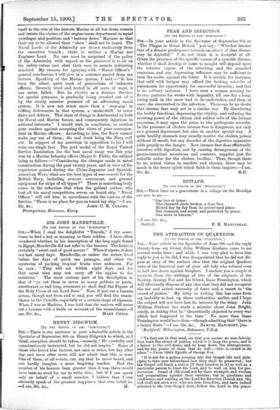FEAR AND INFECTION.
[TO THE EDITOR OF THE "SPECTATOR:1
Sin,—In your article in the Spectator of September 8th on "The Plague in Great Britain " you say : " Whether intense fear of a disease predisposes towards an attack of that disease may be doubtful." I do not think it is doubtful at all. Given the presence of the specific course of a zymotic disease, whether it shall develop or come to naught will depend upon the relative vigour of the attacking and the attacked organism, and any depressing influence may be sufficient to turn the scales against the latter. It is certain, for instance, that cold with fatigue may afford the lurking microbe of pneumonia its opportunity for successful invasion; and this is no solitary instance. I have seen a woman nursing in- fluenza patients for weeks with impunity, till one day a long, tiring walk in the snow had to be undertaken, and then, at once, she succumbed to the infection. There can be no doubt that intense fear may act in a similar way. By disordering the bodily functions, depressing the vitality, and reducing the resisting power of the citizen and soldier cells of the human organism, it may open the gates to the pathogenic microbe. In the presence of cholera intense fear is dangerous, not only as a general depressant, but also in another special way. A quite healthy stomach may usually receive the cholera poison without ill result, but any disorder of the digestive apparatus adds greatly to the danger. Now intense fear does effectually interfere with digestion, and by causing derangement of the gastro-intestinal secretions and contents, supplies just the suitable nidus for the cholera bacillus. Thus, though there be no actual virtue in amulets and charms, there may be much in the brave spirit which faith in them inspires.—I am,






































 Previous page
Previous page